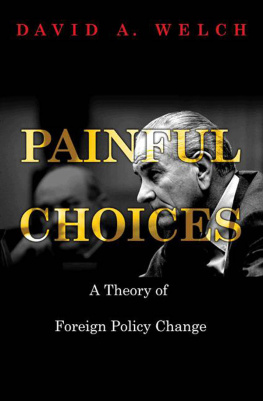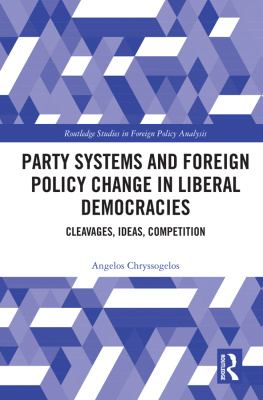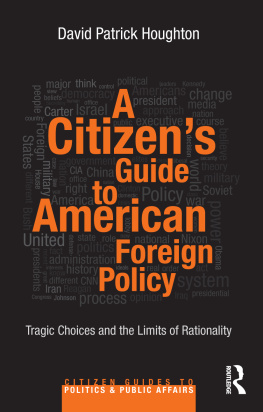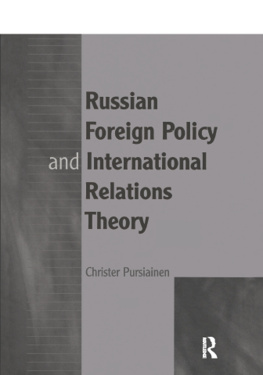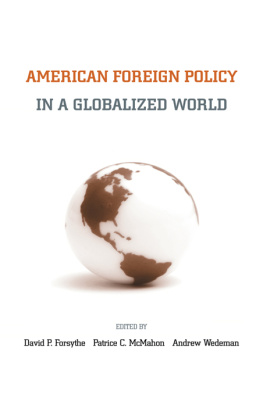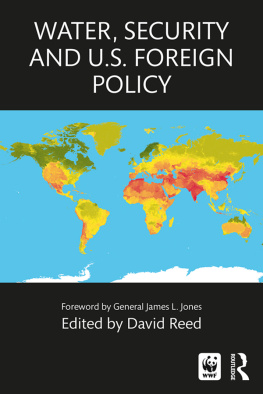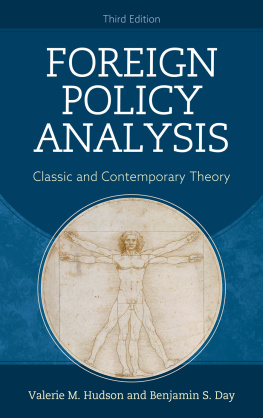Painful Choices
Painful Choices
A THEORY OF FOREIGN
POLICY CHANGE
David A. Welch
Copyright 2005 by Princeton University Press
Requests for permission to reproduce material from this work
should be sent to Permissions, Princeton University Press
Published by Princeton University Press,
41 William Street, Princeton, New Jersey 08540
In the United Kingdom: Princeton University Press,
3 Market Place, Woodstock, Oxfordshire OX20 1SY
All Rights Reserved
Welch, David A.
Painful choices : a theory of foreign policy
change / David A. Welch.
p. cm.
Includes bibliographical references and index.
ISBN 0-691-12340-3 (cloth : alk. paper)
1. International relations. 2. International
relationsCase studies. I. Title.
JZ1242.W45 2005
327.101dc22 2004065770
British Library Cataloging-in-Publication Data is available
This book has been composed in Sabon
Printed on acid-free paper.
pup.princeton.edu
Printed in the United States of America
1 3 5 7 9 10 8 6 4 2
For my students
CONTENTS
CHAPTER 1
Surprise, Anticipation, and Theory
CHAPTER 2
A Theory of Foreign Policy Change
CHAPTER 3
Useless Islands Disputes
CHAPTER 4
American Boys in an Asian War
CHAPTER 5
Free Trade with the United States: Two Funerals and a Wedding
CHAPTER 6
Conclusion
FIGURES AND TABLES
FIGURES
TABLES
ACKNOWLEDGMENTS
My recompense is thanks, thats all,
Yet my good will is great, though the gift small.
William Shakespeare, Pericles, Prince of Tyre, 3:4
MANY PEOPLE have helped me with this book in many ways, large and small, wittingly and unwittingly. In particular I would like to thank those who have taken time to read and comment on drafts, share their expertise, or avail me of their dogged research assistance. These include, in strictly alphabetical order: Emanuel Adler, Aisha Ahmad, Alan Alexandroff, Nicole Anastasopoulos, Tarini Awatramani, William Berman, Steven Bernstein, Thomas Biersteker, Jim Blight, Robert Brigham, McGeorge Bundy, Marc Busch, Chester Cooper, Wolfgang Danspeckgruber, James Der Derian, Michael Donnelly, Peter Feaver, Michel Fortmann, Sir Lawrence Freedman, Aaron Friedberg, Aaron Gairdner, Gary Goertz, Ellen Gutterman, Michael Hart, Terry Hoppmann, Ole Holsti, Jeffery Kimball, Hiroshi Kimura, Masato Kimura, John Kirton, Bilge Kocyigit, janet Lang, Waleuska Lazo, Richard Ned Lebow, Fredrik Logevall, Gillian Manning, Ana Margheritis, Charles William Maynes, Robert McNamara, Kim Richard Nossal, John Owen, Louis Pauly, Yasuyo Sakata, Elias Scorsone, Scott Silverstone, Steve Smith, Janice Gross Stein, Sir Crispin Tickell, Ashwini Vasanthakumar, Geoffrey Wallace, Alexander Wendt, Melissa Williams, and Noboru Yamaguchi. I would also like to thank participants in seminars at the University of Arizona; the Thomas J. Watson Jr. Institute for International Studies, Brown University; Duke University; McGill University; lUniversit de Montral; the Center for International Studies, Princeton University; and the Munk Centre for International Studies, University of Toronto. Not least, I would like to acknowledge the generous financial and institutional support of the Social Sciences and Humanities Research Council of Canada; the Thomas J. Watson Jr. Institute for International Studies, Brown University; the Weatherhead Center for International Affairs, Harvard University; and the Center for International Studies, Princeton University. Any errors in this book are, of course, my own.
Judgment in Foreign Policy: Theory and Application, ed. Stanley A. Renshon and Deborah W. Larson (Lanham, MD: Rowman & Littlefield, 2003), pp. 191215; and Masato Kimura and David A. Welch, Specifying Interests: Japans Claim to the Northern Territories and Its Implications for International Relations Theory, International Studies Quarterly, vol. 42, no. 2 (June 1998), pp. 213244 (an earlier version of which appeared as CFIA Working Paper 973, Cambridge: Center for International Affairs, Harvard University, 1997). I would like to thank the editors for their forbearance.
Painful Choices
Introduction
DURING THE 2000 U.S. presidential campaign, Republican candidate George W. Bush criticized the Clinton administration for overextending American commitments, failing to focus on key American interests, and burdening the U.S. military with tasks unrelated to its core mission. A president should authorize the use of military force, Bush insisted in the first of two presidential debates with Democratic candidate Al Gore, only if its in our vital national interests, when there is a clear understanding as to what the mission would be, when the United States is prepared and trained to... win, and when there is a clear exit strategy. I would take the use of force very seriously, Bush asserted. I would be guarded in my approach. I dont think we can be all things to all people in the world. I think weve got to be very careful when we commit our troops. The vice president and I have a disagreement about the use of troops. He believes in nation-building. I would be very careful about using our troops as nation-builders.1
In the second debate, Bush insisted that the United States should be humble in how we treat nations that are figuring out how to chart their own coursemore respectful of the principle of state sovereignty, in other wordsand he lambasted the Clinton administration for allowing the international coalition containing Saddam Hussein to weaken. The coalition that was in place isnt as strong as it used to be, Bush complained. He is a danger; we dont want him fishing in troubled waters in the Middle East. And its going to be hard toits going to be important to rebuild that coalition to keep the pressure on him.2
With respect to the general principles of American foreign policy, in short, Bush promised restraint and selectivity. Bush would be a domestic politics president, most analysts surmised, as one might expect from a man without much experience of, interest in, or even knowledge of foreign affairs. Few international politics issues captivated him. Iraq was an exception. When host Jim Lehrer asked during the second debate whether Bush thought he could get [Saddam] out of there, Bush replied, Id like to, of course, and I presume this administration would as well. But the main thing was containment. Bush would redeem Clintons failed Iraq policy by reinvigorating multilateralism.
By the spring of 2003, the U.S. military had toppled Saddams regime, having already toppled the Taliban regime in Afghanistan, and was heavily engaged in nation building in both countries.3 Bushs call for humility, selectivity, restraint, and reinvigorated multilateralism had morphed into a doctrine of preventive war near-universally condemned abroad as dangerously unilateral.4 While the American action in Afghanistan enjoyed considerable international support, the war in Iraq did notin fact, the United Nations Security Council was strongly opposed. A domestic-politics president had suddenly become a foreign-policy president, indeed a national-security president broadly construed, largely unconcerned with multilateralism, and anything but humble. What had happened to provoke such a change?
The answer, of course, is 9/11.5
Now, at one level there is nothing surprising about this. 9/11 was the deadliest terrorist attack in history. By toppling both World Trade Center towers in the most horrific way imaginableusing hijacked airliners as weapons of mass destructionOsama bin Ladens al-Qaeda network dealt the United States a psychological blow rivaled in American history only, perhaps, by the Japanese surprise attack on Pearl Harbor on December 7, 1941.6 Suddenly the American peopleand, of course, their presidentfelt acutely vulnerable in a way they had never felt before, and to an enemy they had hitherto underestimated. It would have been odd indeed if American foreign and domestic policy had not reflected the widespread perception in the United States that the world had changed both suddenly and profoundly. A faceless enemy has declared war on the United States of America, Bush declared on September 12; So we are at war.7


